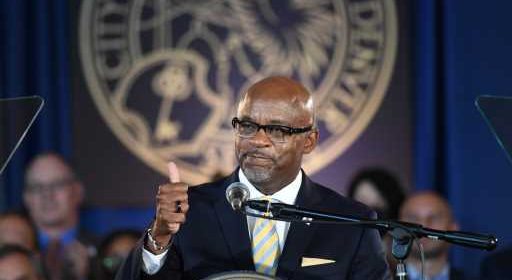Denver Mayor Hancock’s final State of the City address highlights efforts to address homelessness, hire, train more cops

Denver Mayor Michael Hancock will ask the city council to dedicate $2 million in federal COVID-19 relief money to a universal basic income program that would support women and families living in homeless shelters.
The modest program — it is expected to give 140 recipients $1,000 a month for a year if supported by the council — was among a handful of new efforts Hancock announced in his 11th and final State of the City address Monday morning.
Speaking in the Montbello Recreation Center gym in his former council district, Hancock took time to thank his family, allies and supporters for their help over his three terms. He also emphasized some of his administration’s past successes while focusing on carrying forward momentum and building on programs and efforts that are working.
“As an administration accountable to the people we serve, we remain committed to justice,” Hancock said. “We remain committed to leaving this city better than we found it. And while this may be my final year as mayor, I pledge to you that I will bring the same energy, creativity and intention as if it were my first.”
The universal basic income effort was part of Hancock’s focus on building a local economy that is globally competitive but also fair and “rooted in justice,” he said. Cities across the country are experimenting with guaranteed income programs, according to news site Mashable. Denver is the only municipality in Colorado on Mashable’s list.
Hancock celebrated the fact that since he took office in 2011, the city has helped rehouse 13,000 people that were previously homeless and built 9,000 affordable homes. He touted programs like the Safe Outdoor Spaces sanctioned campsites and the use of hotel vouchers that provide more stable options for people living on the street while decrying the national housing crisis, opioid epidemic, COVID-19 pandemic and federal neglect that he said have contributed to pushing more people into homelessness while the city works to stem the tide.
“By using hotels and other properties as temporary bridges to something more permanent, we can do a better job moving people off the streets and into stable housing, and not just down the street to another encampment,” Hancock said. “This will remain a top priority for the coming year because what we are seeing on our streets is an unjust humanitarian crisis.”
The Hancock administration plans to push for a fairer economy by expanding the city’s downpayment assistance pilot program that is focused on neighborhoods that were previously subject to racist housing practices. The administration is also working to launch an investment fund for women- and minority-owned small businesses, the mayor said. That fund, expected to grow to $50 million over the next five years, will be named after late Black civil rights and business leader Herman Malone.
Hancock also spent significant time addressing another issue for which he has frequently been maligned in his third term: Denver’s spiking crime rate.
He discussed the need to expand things like the city’s STAR program, which sends mental health professionals to calls for which an armed police officer may not be needed. The city will soon be opening an alternative to jail for people in need of treatment and behavioral health support, he said.
Related Articles
Politics |
WATCH: Mayor Michael Hancock gives the State of the City addressPolitics |
Pepsi’s largest U.S. plant to open in Denver next yearPolitics |
Biden nominates DIA leader Phil Washington to head FAA, raising worries of vacuum at airportPolitics |
Colorado Avalanche’s joyous Stanley Cup parade and celebration bring estimated 500,000 to downtown DenverPolitics |
Denver Mayor Hancock slams door on idea that Douglas County could take over mountain park
Ultimately, Hancock sees the key to combating rising crime coming in the blue uniforms worn by Denver police officers. Denver should have the best trained, best equipped and most effective police department in the country, something that the department is actively working on, the mayor said.
“The Denver Police Department has tripled the number of hours of continuing education over what is required. They’ve implemented new training to support de-escalation tactics. Both the police and sheriff departments have adopted enhanced peer intervention practices. And DPD has contracted with a nationally recognized civilian expert to review and elevate training courses,” Hancock said.
Hancock’s speech comes less than 48 hours after Denver police officers injured five people on a busy commercial strip in Lower Downtown Denver. The people were injured when police opened fire on a suspect they alleged was pointing a gun at an officer after they tried to confront the suspect after he got in a fight outside a bar. The suspect was wounded by police but is expected to recover.
Hancock did not address the incident during his speech Monday with several DPD officials sitting behind him on the stage. A spokesman on Monday said the mayor is withholding comments on the situation out of respect for the integrity of the investigation.
“While we remain focused on making our law enforcement better, we cannot lose sight of their mandate. A dramatic spike in violent crime has damaged our city’s sense of safety,” Hancock said. “We’re going to continue to hire more police officers to keep our neighborhoods safe.”
Source: Read Full Article

